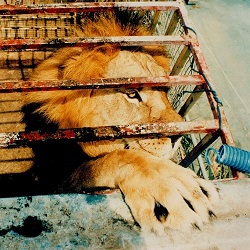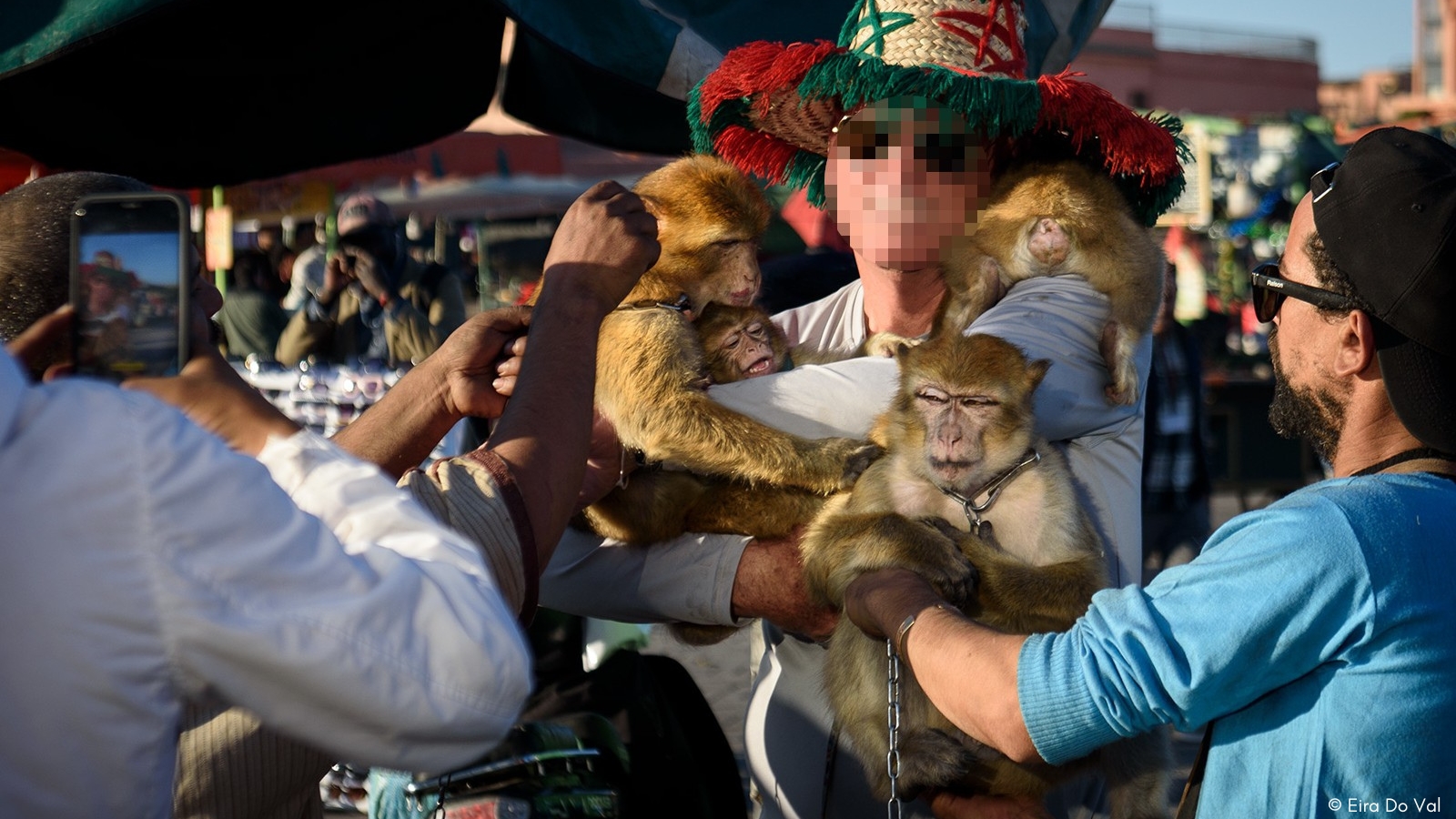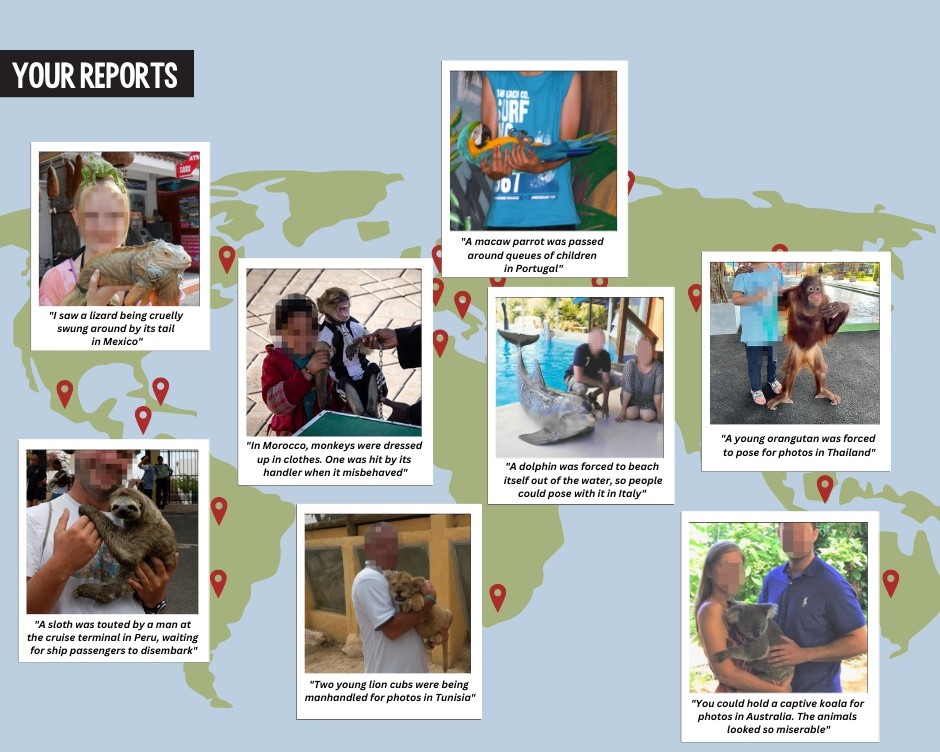It’s time to stop selfish selfies
5 July 2023
IT’S TIME TO STOP SELFISH SELFIES
Born Free’s Selfish Selfies campaign is raising awareness of the use of captive wild animals as props for souvenir photos and encouraging people to pledge not to support this exploitative industry. It’s a global issue affecting thousands of animals, explains Born Free’s Captivity Campaigns Information Coordinator Sarah Jefferson.
One month ago, Born Free launched its Stop Selfish Selfies campaign, asking members of the public to pledge never to take a photo with a captive wild animal – and it’s great to see so many of you agreeing with us, with more than 4,500 people signing the pledge already.
Our Selfish Selfies campaign delves deeper into the use of captive wild animals as living props for photos and questions why people, including many animal lovers, crave such a souvenir that can only be obtained by supporting animal exploitation. It’s an industry that profits from inflicting animal suffering and threatens species in the wild. Read more about the multitude of issues in our new report ‘Selfish Selfies: The Exploitation of Captive Wild Animals for Souvenir Photos’.
We receive hundreds of tourist reports via our Raise the Red Flag platform concerning the exploitation of captive wild animals as living props for souvenir photos and selfies around the world. It is a widespread problem affecting thousands of animals, but the top five countries most reported where this activity has been witnessed are Thailand, Mexico, Morocco, Dominican Republic, and Cyprus.
Most notably in Thailand is the use of animal photo props within many zoos, elephant camps, and other captive facilities. In Cyprus, the use of tiger cubs and a solitary elephant in Paphos are the focus of tourist reports. Whilst in Morocco, the exploitation mainly takes place in the bustling marketplaces of Marrakesh with numerous barbary macaque monkeys used. These macaques are endangered in the wild, yet they continue to be illegally captured to supply the photo prop industry. In Mexico, the use of big cat cubs at captive facilities, plus the use of monkeys and iguanas at tourist hotspots is commonplace. In the Dominican Republic, animals such as squirrel monkeys, iguanas and parrots are touted on the beaches outside large hotels, targeting guests as they relax in the sun.
Some people might question what real harm that one quick photo could cause, but it should be remembered that there are many other people handling or posing with the same animal every single day. Animals used for photos are frequently kept in poor conditions; denied access to shelter, shade, food or water; are restrained, manipulated and manhandled; and in some cases, mutilated when their teeth or claws are removed, or their wings clipped. They are exposed to stressful environments and situations such as crowds of people, constant touching and holding, noise, and camera flashes. Animals are frequently transported over long distances, confined to tiny cages and crates or even bags and sacks. Denying captive wild animals the opportunity to express natural behaviours, is highly stressful and often results in both compromised psychological and physical welfare.
And if that isn’t enough of a deterrent, the serious risk of personal injury or death as a result of scared and distressed animals biting, scratching or lashing out, plus the dangers of ‘zoonotic’ disease transmission, should be the ultimate disincentive not to take selfish selfies with captive wild animals.

WHERE DO THE ANIMALS COME FROM?
Some animals used as photo props may be obtained from captive sources, such as zoos or private breeders. Young animals, notably big cats and primates, are often prematurely separated from maternal care and hand-reared to habituate them to human contact and handling. This enforced separation is likely to cause significant stress to both mother and offspring.
Some animals, most notably primates, are taken from the wild. The capture and trapping of infant animals can result in the injury or death of their parents and other family members. Some species frequently used as photo props, such as barbary macaques and the Bengal slow loris, are classified as ‘Endangered’ in the wild. Other species used, such as the brown-throated sloth, are experiencing a population decline in the wild.

WHAT HAPPENS TO THE ANIMALS?
Once photo prop animals mature and become more difficult or dangerous to handle, and no longer able to make money for the owners, their future can become uncertain. They may end up kept in terrible conditions, sold off to zoos, circuses, or as pets, being abandoned or even killed. One of the first lions Born Free rescued back in 1995 was Raffi who had previously been used as a tourist photo prop cub in Spain. When he was around 6 years old, he was discovered being held in a filthy cage on the rooftop of a derelict bar in Tenerife.
Many captive facilities, including cub petting and photo providers, claim that they breed animals for conservation purposes and will, at some point in the future, release them into the wild. But this is extremely unlikely to ever happen, not least because the animals now see humans as a source of food, would not have sufficient fear of humans, or have the knowledge of how to look after themselves if released.
Some lion cubs used for petting and photo opportunities, such as in South Africa, may eventually being sold into the ‘canned’ hunting industry where they are shot and killed by trophy hunters, or killed so their bones and other body parts can be sold into markets in the Far East. Tigers are bred in their thousands in captive facilities in many Asian countries, where visitors can bottle-feed cubs and pose for photos. Such facilities are often connected to the illegal trade in tigers and their body parts.
TAKING ACTION
In order to tackle the global photo prop issue, it’s going to take a combined effort. National governments need effective and well-enforced legislation to address animal welfare issues and protect their precious wildlife and biodiversity. Some countries or regions may try their best to tackle illegal wildlife trade and confiscate the animals involved, but authorities don’t always have the will or resources to intervene or lack the expertise to keep on top of this growing problem. Born Free regularly calls on national governments and authorities to urgently investigate public reports on the use of captive wild animals as photo props in their countries, particularly where illegal wild capture is taking place.
Better regulation of the global travel industry is needed to prohibit the advertising and sale of activities that negatively impact on animal welfare, such as ‘The Animals (low welfare activities abroad) Bill’, which has been introduced as a ‘Presentation Bill’ by Angela Richardson MP and has passed its 3rd reading in the Commons. Born Free has contributed to and is a co-signatory of a briefing to the House of Lords, urging that this important proposed legislation is passed.
Individual travel companies and tour operators also need to do more to ensure that they don’t promote or sell excursions that feature animal photo props and close contact activities with captive wild animals. ABTA, the British association of tour operators and travel agents has produced guidance to its trade members which includes a list of ‘unacceptable practices’. The use of captive wild animals as photo props is listed as an unacceptable practice. However, although ABTA members should not be purposefully selling or promoting the use of captive wild animal as photo props, their customers may still end up encountering it when visiting certain locations, captive facilities, or hotels.
As much of the world returns to international travel following Covid-19, we’re urging people to consider what implications their actions on holiday, such as posing for photos and selfies, may have on the welfare of captive animals, on species in the wild, and on their personal health and safety. People must stop supporting the global photo prop industry by pledging not to pose with captive wild animals for photos and selfies, and where this activity is encountered, to report it and speak out.
SIGN THE PLEDGE READ OUR REPORT RAISE THE RED FLAG
Macaque map image © Aaron Gekoski, Born Free


